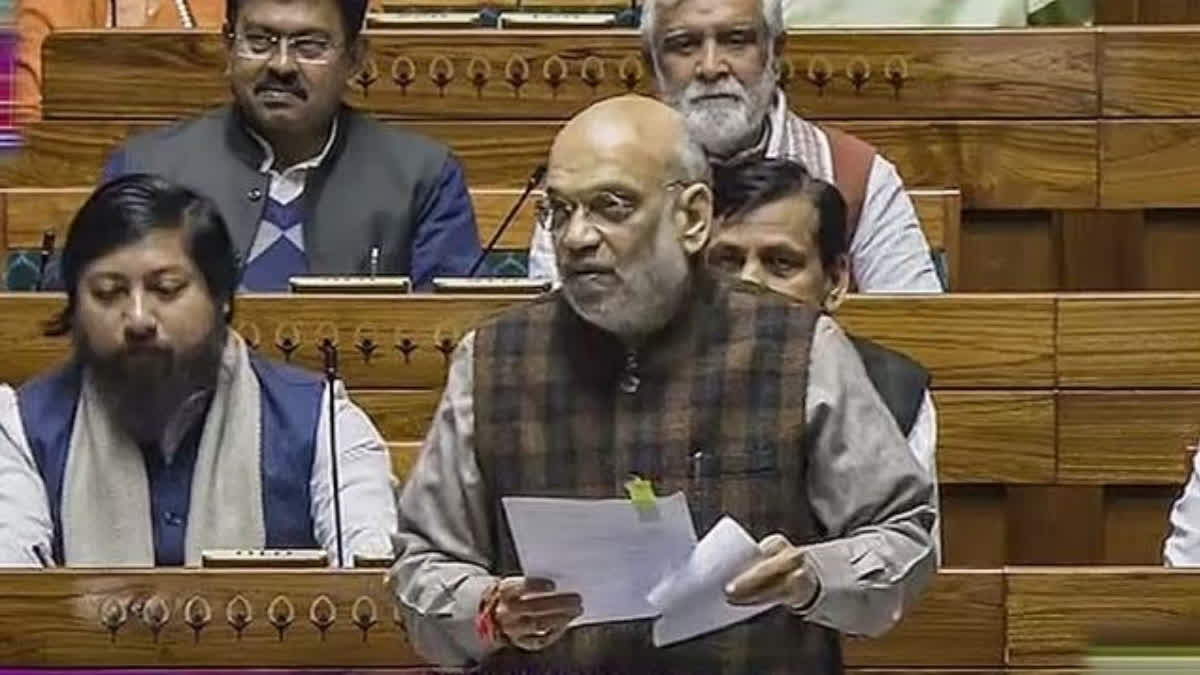New Delhi: Three new bills that seek to overhaul the colonial-era criminal laws, making punishments more stringent for crimes such as terrorism, lynching, and offences endangering national security, were approved by Parliament on Thursday. The bills were passed in the Rajya Sabha by voice vote. The Lok Sabha had approved these on Wednesday. Both houses of the Parliament adjourned sine die a day ahead of the schedule.
The bills that repeal and replace the Indian Penal Code, Code of Criminal Procedure and the Indian Evidence Act will usher in a new era in the criminal justice system, Home Minister Amit Shah said while replying to a debate in the Upper House of Parliament. The Bharatiya Nyaya (Second) Sanhita, Bharatiya Nagarik Suraksha (Second) Sanhita and the Bharatiya Sakshya (Second) Bills will now go to the president for her assent, upon which these will become laws.
Just like in the Lok Sabha, the legislations were passed in the Rajya Sabha in the absence of most opposition MPs, who were suspended for unruly behaviour while pressing for a discussion on the December 13 security breach in Parliament. Replying to the debate, Shah said once the new criminal laws are implemented, the entire process from FIR to judgment will be online. Their implementation will ensure the end of the 'tareekh-pe-tareek'-era and justice will be delivered in three years, he said.
Elaborating on the new provisions, Shah said terrorism has been defined and mob lynching made punishable with capital punishment. Also, stringent punishment has been prescribed for those who work against the country, he said. The absence of the opposition Congress did not stop him from taking a swipe at the party, with Shah saying those who wear "Italian glasses" cannot feel the pride in the Indian Parliament framing the new criminal laws.
His jibe was directed at the party's former chief Sonia Gandhi, who is of Italian descent. Shah said the bills had perhaps the widest consultations ever and 72 per cent of the recommendations of the Parliamentary Standing Committee which scrutinised the bills were accepted. "We were charged for protecting mob lynching. But you (Congress) did not make law, we have. There is no bigger crime than killing a human being and it will be dealt with stringently," he said, adding the least number of mob lynching cases happened during the Narendra Modi government.
'Watershed moment', says PM Modi
The passage of Bharatiya Nagarik Suraksha Sanhita, 2023, Bharatiya Nyaya Sanhita, 2023 and Bharatiya Sakshya Adhiniyam, 2023 is a "watershed moment" in India's history, Prime Minister Narendra Modi said shortly after the bills were passed by Rajya Sabha.
"These Bills mark the end of colonial-era laws. A new era begins with laws centred on public service and welfare. These transformative Bills are a testament to India's commitment to reform. They bring our legal, policing, and investigative systems into the modern era with a focus on technology and forensic science. These Bills ensure enhanced protection for the poor, marginalised and vulnerable sections of our society," Modi posted on X
-
The passage of Bharatiya Nagarik Suraksha Sanhita, 2023, Bharatiya Nyaya Sanhita, 2023 and Bharatiya Sakshya Adhiniyam, 2023 is a watershed moment in our history. These Bills mark the end of colonial-era laws. A new era begins with laws centered on public service and welfare.
— Narendra Modi (@narendramodi) December 21, 2023 " class="align-text-top noRightClick twitterSection" data="
">The passage of Bharatiya Nagarik Suraksha Sanhita, 2023, Bharatiya Nyaya Sanhita, 2023 and Bharatiya Sakshya Adhiniyam, 2023 is a watershed moment in our history. These Bills mark the end of colonial-era laws. A new era begins with laws centered on public service and welfare.
— Narendra Modi (@narendramodi) December 21, 2023The passage of Bharatiya Nagarik Suraksha Sanhita, 2023, Bharatiya Nyaya Sanhita, 2023 and Bharatiya Sakshya Adhiniyam, 2023 is a watershed moment in our history. These Bills mark the end of colonial-era laws. A new era begins with laws centered on public service and welfare.
— Narendra Modi (@narendramodi) December 21, 2023
He said that with these bills, India has bid "goodbye to sections on sedition". "At the same time, these Bills come down heavily on organised crime, terrorism and such offences which strike at the root of our peaceful journey to progress. Through them, we have also bid goodbye to the outdated sections on sedition. In our Amrit Kaal, these legal reforms redefine our legal framework to be more relevant and empathy-driven," the Prime Minister said.
Also read:




